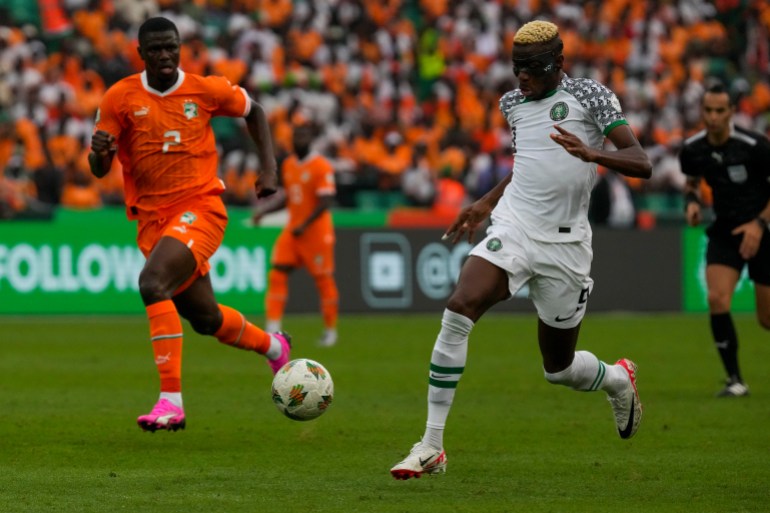Abidjan, Ivory Coast – As the quarter-finals of the ongoing Africa Cup of Nations (AFCON) begin on Friday in Ivory Coast, none of the top five ranked teams in the December 2023 FIFA rankings will take part.
Reigning champions Senegal, 2022 World Cup semi-finalists and pre-tournament favorite Morocco, 2004 champions Tunisia, two-time champions and 2019 winners Algeria and seven-time AFCON kings Egypt are all eliminated. Other top teams such as five-time champions Cameroon and four-time winners Ghana have also left the competition.
In a tournament characterized by the frequency of upsets, it is the unlikely rise of some of the continent’s less-cherished teams that is grabbing the headlines.
Currently, four of the last eight have never won the competition, meaning the odds of becoming champions for the first time are 50-50. These uncrowned four include perennial favorites Guinea and Mali, who have had talented teams since the turn of the millennium but have never been able to progress past the final four. But there are also Cape Verde and Angola, who have never reached the semi-finals before.
And some of the other results were incredible: Equatorial Guinea triumphed 4-0 over Ivory Coast, while Cape Verde beat Ghana 2-1.
“The results you see in the AFCON are impossible in the Euros or the Copa America,” former Nigeria striker Victor Ikpeba told Al Jazeera. “Imagine the Faroe Islands beating Germany or England losing to San Marino. It is rare for Venezuela to beat Argentina or Brazil, but in African football it is possible.”
In addition, there was an unprecedented number of goals in this edition: with 105 goals scored before the quarter-finals, the results of the last two editions were already exceeded.

Face the challenge
The increase in goals was expected after AFCON was upgraded to a 24-team tournament from this edition. Some – including Ikpeba, the 1997 African Footballer of the Year – argue that this very factor is responsible for the improved record of historically modest nations in this year’s edition.
“Expanding the AFCON from 16 to 24 teams has given the so-called minnows the opportunity to excel as they compete against some of the most successful countries on the continent,” he says.
“So many shocking results at the AFCON show that countries in Africa are developing quickly and are not afraid of any team.”
This idea is reinforced by the fact that the continent’s elite teams made significant strides on the global stage in Qatar in 2022. For the first time ever, all five of its representatives won at least one game at the World Cup, and not only did two of them reach the knockout stages, but Morocco also became the first African team to reach the semi-finals. The Atlas Lions also amazed more demanding, higher-ranking nations such as Belgium, Spain and Portugal and therefore went into the AFCON 2023 as favorites.
But even Morocco has since fallen by the wayside, bowing out of the competition after a 2-0 defeat to South Africa, ranked 66th in the world, more than 50 places behind the North Africans.
According to industry insiders, this is an indication that it is not the better sides that are becoming weaker, but rather that the smaller nations are rising to the challenge.
“African football is a different area. The Atlas Lions of Morocco may roar loudly at the World Cup, but can easily be tamed by a team 60 places below them in Africa,” says Mimi Fawaz, broadcast journalist and African football specialist.
“Remarkable changes are taking place on the continent. Some countries rely on local managers and also fill gaps thanks to improved facilities,” she adds.

Growth on and off the pitch
Targeted investment in local sports infrastructure has also been central to their new success, much of this based on the FIFA Forward program. Designed with the aim of providing comprehensive, tailored football development support to all FIFA Member Associations (MAs), the program is based on three principles: more investment, more impact and more oversight.
According to the latest FIFA Forward Report, funding totaling $2.8 million was made available to 211 MAs between 2016 and 2022. The prerequisite for these disbursements was compliance with the program regulations and annual audits by FIFA at the end of each financial year. With more resources, smaller countries were also able to attract more actors from the diaspora.
The Mauritanian Football Association (FFRIM) is a shining example of the success of the initiative with facilities in the capital Nouakchott, where $11.1 million in FIFA Forward funding has been used to radically renew and develop football infrastructure.
The FFRIM building is one of several projects supported, as is the Sheikha Boidiya Stadium. The 5,000-capacity venue, originally built in the 1960s, has undergone a major facelift, with a new synthetic playing surface being laid and off-field facilities such as changing rooms also being renovated.
The impact on the national team’s performance was obvious: Mauritania qualified for three consecutive AFCON tournaments and in this edition not only scored their first AFCON goal from open play, but also recorded their first win and for the first time the Knockout round reached time and eliminated Algeria in the process.
Chinguetti’s Lions didn’t make it to the last eight, but Cape Verde did and played some of the best football of the tournament. However, their success has similar roots.
Back in July 2022, a FIFA delegation completed a four-day visit to Cape Verde, unveiling facilities such as new artificial turf pitches and the renovated academy and headquarters of the Cape Verde Football Federation (FCF), all funded by the same program.
“Countries like Mauritania and Cape Verde secure a place in the knockout phase of the AFCON, but some of their gains and successes are intentional and rely on the ability of their associations to receive FIFA funding for facility and pitch development as well to improve local games,” Gelson Fernandes, FIFA director of member associations in Africa, tells Al Jazeera.
At the next World Cup, which will be hosted by the USA, Canada and Mexico, the continent will have at least nine starting places for the first time. The World Cup qualifying series began in October and the likes of Rwanda and Comoros are top of their respective qualifying groups after two games.
If their performances – like those of the underdogs at AFCON 2023 – are anything to go by, a continental awakening could be underway, led by a change of the old guard. Football officials, like fans, appear to be excited by the prospect of the entertaining football that increasing competition will bring.
“Success on the pitch and growth off the pitch can only impact African teams and the 2026 World Cup will give African countries the opportunity to show what they are capable of,” Fernandes predicts.






Recent Comments